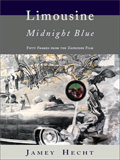Review by Joanne Baines
Red Hen Press
P.O. Box 3537
Granada Hills, CA 91394
2009, 80 pp., $16.95
ISBN-13 978-1597091282
www.redhen.org
It would be wonderful for all history lessons to be presented in poetry, plays and song. The dry historical texts with their unfamiliar names and dates are so easily forgotten once the test has been passed. If an event is set to rhythm, it permeates your soul and stays with you. If the beat that you hear from this neighboring village pounding out an important story is loud and strong and the words are eloquent enough it will persist until you find it necessary to explore the subject further and add more verses.
“Limousine, Midnight Blue” is such a poem. Fifty poems, each 14-lines and tied to a frame in the Zapruder film, the horrible 26-second home movie that captures the assassination of President John F. Kennedy.
This collection of poems is a documentation of the murder and the radiating shockwaves of repercussion, but it is also a very personal book revealing the author’s raptor-like view and a passion for telling this history well. Every aspect of the tragedy is considered, from the space program to Vietnam and the culture of America at the time.
The poems start at frame Z-150 where you can see the motorcade come into view and the first stanza from poem “Z-150” proclaims:
Here comes authority, waving to the many,
riding with the few. Here comes smiling, shining you driven down the ribbon of the end, alone in all that sun
and noise, those thousand hands and eyes and cameras.
Aristotle is introduced in “Z-156” where he teaches the physics that are so important to a bullet. I believe that Aristotle himself would be quite pleased with the choice of words used in these poems. “The perfection of diction is that it be at once clear and not pedestrian” (Aristotle in the Poetics). The combining of ancient Greece and pop culture, Nietzsche and Addison’s disease, stacked syringes and outer space illustrate not only the epic nature of the subject but also the breadth of resources Jamey Hecht has at his disposal.
There is a longing for this thing to have never happened and an accusation because it did. In “Z-162” you hear a naive cry for Santa Claus to stop it, much like the collective consciousness of America looked for Superman to stop that second plane from hitting that second building. A sense of futility and sorrow prevail because in spite of all of the witnesses, the analysis, the precise numbers, the studies, the slow motion, close ups, and the endless reports, it still happened and it seems as if we will never get a straight answer.
The speaker and viewpoint change with each poem and with every differing persona the imagery, rhythm, alliteration, texture and closing combine to create a depth of feeling that belies the structure of only 14 lines. The crafting of elegant enjambements and definitive end stops is effective in alternatively pulling us along and creating tension.
In “Z-163” the earth is impregnated by the limousine (license plate # GG-300) in order to give birth to future wars and toys and sedatives:
Z-163
How about the triple underpass as the cervix of the world
and GG300 as the tragic DNA-laden tadpole
that makes the poor young planet swell with future
wars and toys and sedatives. How aboutthe limousine is itself one giant bullet
pointed, well, you know where. In fact,
you’re still bleeding. Or the pink pillbox hat
is also a horse tranquilizer we must every one of uschoke down, and the headlights are hypnotic lamps
and the pathetic death-of-a-salesman lunge
of Clint Hill onto the lurching hood
is the official dance of the People’s DemocraticRepublic of Craven, Malignant, Heartbroken, Sleepwalking.
Or maybe that’s only the Miltown talking.
We are drawn into these surreal visions of the time period as though we are watching Satan’s vacation slides and then skid to a stop with the mention of the then-favored tranquilizer.
“Z-166 “is a brilliant catalogue, an incantation of the names of the conspirators. Because the names are familiar and each one incites a visceral reaction it is difficult to achieve the hypnotic trance state that a catalogue poem usually inspires. However, the catalogue form is a wonderful allegory for the soporific apathy that allowed these men to go unpunished for this particular crime.
As the Lincoln, and the poems, progress “down the ribbon of the end,” a dynamic tension builds as we are confronted with the inevitable conclusion. Towards the end, “Z-192,” the author assumes the persona of an angry John Kennedy:
Imagine me riding skeletal down Main Street on a bicycle.
I get death, you get the shock of your lives, your daughters
heroin addicts and your sons marines on fire in mud, guilty.
“Limousine, Midnight Blue” is an elegy written out of heartbreak and frustration and yet the author has surmounted those emotions long enough to expertly blend image, rhythm and voice to create the coalescence all poetry strives for. This is history as it should be told. There are terms and phrases that are not common knowledge; Jamey Hecht is kind enough to provide a section at the end of the book that gives direction for these things. He has also created some “video trailers” for the book at
www.jameyhecht.com
My rating? As with all of the best books of poems, read it until it is wrecked.